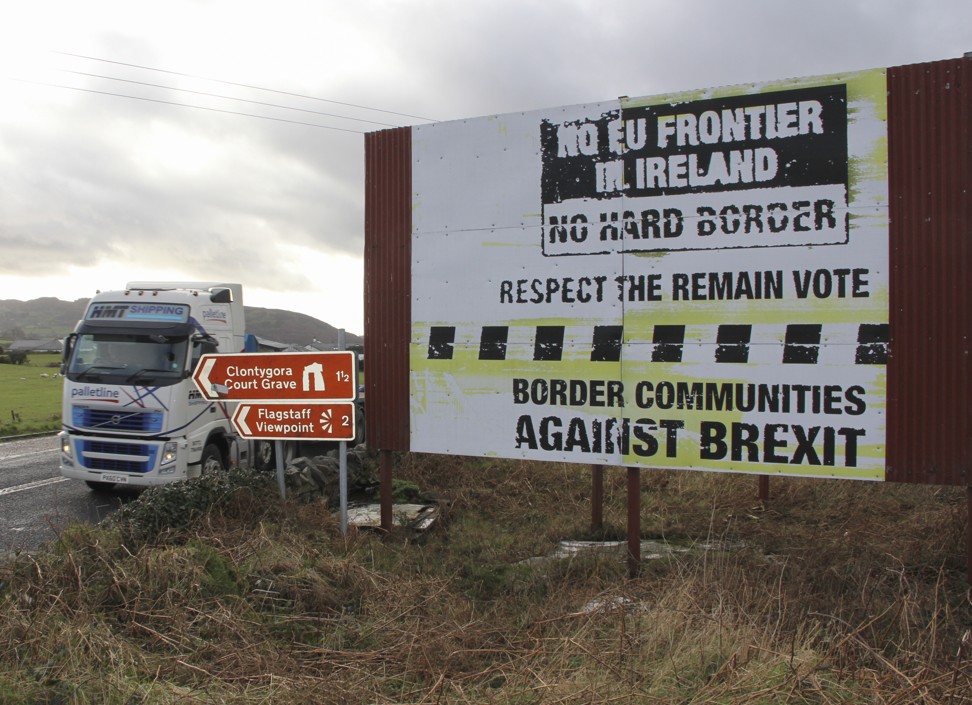
Brexit has left Northern Ireland’s Chinese community confused and divided, much like the rest of Britain
- Britain’s exit from the European Union raises questions among those who have made Northern Ireland their home
- Anna Lo, the Hong Kong-born former Alliance Party politician, talks about the backstop, borders and the Democratic Unionist Party

She may be retired but Anna Lo is as outspoken as ever. Brexit, backstops, borders, racism, inequality – and especially her political nemesis, the Democratic Unionist Party (DUP) – all suffer a tongue-lashing when we meet over cappuccinos in Belfast, the capital of Northern Ireland, to discuss a political world gone mad.
“I haaate the DUP,” says the 68-year-old firebrand ex-politician, her voice raised, scrunching up her face as if she’s just swallowed a bitter pill, to illustrate her enmity for the hitherto little-known political group that has a controlling hand on Brexit and the future for more than 500 million Europeans.
The DUP is the largest political party in Northern Ireland – a constituent nation of the United Kingdom – and unexpectedly became kingmaker after British Prime Minister Theresa May’s Conservative government lost its majority in the 2017 general election. May reluctantly had to join forces with the Christian-right DUP and its 10 London parliamentarians to keep her party in power.
In the 2016 Brexit referendum, a majority of people in Northern Ireland (55.8 per cent) voted to remain in the European Union, but the Eurosceptic DUP voted to leave. Combining with arch Brexiteers in Westminster, it has been using its veto in Brexit talks to block May’s controversial withdrawal agreement with Brussels, elements of which it finds unacceptable.

“The DUP are old-school conservatives, hard-line bigots who do not see the economic benefits and the social cohesion that a customs and trade union with the EU brings. I really hope the DUP go down in the history books as the party that […] wrecked the future of the generations that come after us,” says Lo, her hands tightening into fists. “As you can tell, I really hate the DUP,” she reiterates, in an adopted Northern Irish accent. She then bursts into nervous giggles.
Aware that everyone within earshot in the small cafe has been privy to her outburst, Hong Kong-born Lo looks around, shrinking into the neck of her jumper and furtively peering out from under her fringe, to scan the coffee-sipping, baguette-munching, eavesdropping clientele; with a population of 1.8 million, Northern Ireland offers all the anonymity of a fishing village in Hong Kong’s New Territories.
“I better watch myself,” she says, slapping a cupped hand to her mouth while with the other picking up an imaginary cosh from the table and walloping herself, “otherwise I might get a bash on the head!”
I laugh with her, although, having started my career in Northern Ireland during the Troubles (late 1960s-1998), when balaclava-clad, gun-toting figures shed blood in the shadows, I feel my skin prickle. Peace might have held in Northern Ireland for more than 20 years, but it wobbles at the slightest provocation, as Lo, once a politician with the liberal, centralist Alliance Party, knows only too well.
When Lo was first elected to the Northern Ireland Assembly, in 2007, she received a torrent of racist abuse. But the threat level was elevated in 2014, when a bullet and a picture of her were sent to a newspaper because someone disliked the way she spoke out against sectarianism and racism. She had wanted some of the murals Belfast is famous for – those depicting paramilitaries – painted over for an international cycling race, worried the intimidating images would send the wrong message about Northern Ireland when they were beamed around the world on television.
She also received “a barrage of racist abuse” on the anonymous cowards’ megaphone of choice, social media, and several men were arrested for making threats. One of them had posted photos of himself holding a machine gun, an election poster of Lo and the chilling warning, “You are next”. He was given a suspended jail sentence and even though his gun was found to have been an imitation, the politician’s clever campaign slogan, “Aim High, Vote Lo”, had lost its appeal.
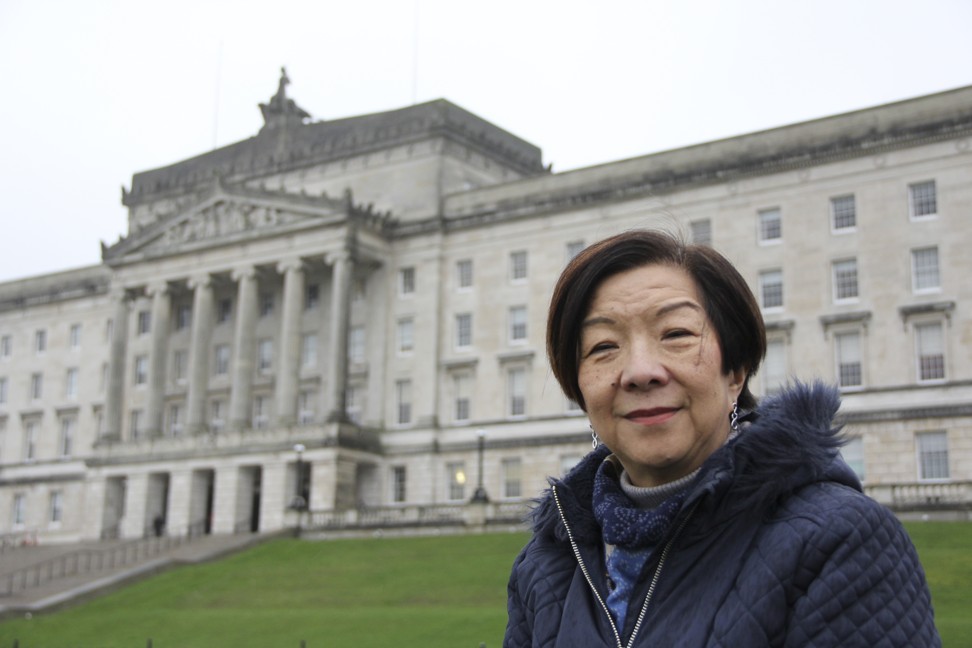
Lo was urged by many of her political colleagues and her two adult sons to move to England for safety. She nearly went, but the self-confessed “anti-colonialist and republican”, who grew up in a North Point public housing block and went to the Shau Kei Wan East Government Secondary School, stayed put.
Political controversies – not least confusion over her stance for a united Ireland – derailed her bid to become a member of the European Parliament in 2014, even though she scored well in the polls. Amid rising racism directed at her and at ethnic minority communities, especially newly arrived Eastern Europeans, and concerned her outspokenness might inflict long-term damage on the Alliance Party, Lo did not stand for re-election. After nine years on the front line of Northern Irish politics, she stepped down in May 2016, to focus on charity and community work.
We scan the cafe and find the coast is clear. Some of the customers recognise Lo but they have not picked up on her paroxysm. Besides, everyone in the place is probably talking about Brexit, backstops, borders and the DUP – the uncertainties that have hijacked coffee shop chit-chat across the British Isles and parts of Europe for the past 2½ years.
“Shall we take a tour and find a place to take a photo, then?” I suggest, and Lo nods. “Surely,” she says, a polite Northern Irish reply, and we drain our cups and head out into the atrocious Ulster weather.
As one demographer put it to me, ‘If there is to be a united Ireland it may be because of a Chinese woman in Finaghy’
I have come to gauge the mood of Northern Ireland’s largest non-European ethnic group, the Chinese, a community swept up in the political typhoon that currently lashes the British Isles, and in the eye of which the Ireland sovereignty question is being asked with increasing intensity. For there is much talk that Brexit could herald the end of the United Kingdom as we know it.
The “backstop” is a last resort in May’s withdrawal agreement that was designed to ensure there would be no hard border, with passport control and customs posts, between Northern Ireland and the Republic of Ireland – the United Kingdom’s only land border with the EU.
Few, if any, citizens on the island of Ireland, whatever their political or sectarian persuasion, would choose a return to a situation that is synonymous with the conflict-ridden past. But a backstop border would still require regulatory differences between Northern Ireland and the rest of Britain, which the DUP rejects, fearing these might lead to a break-up of the union.
I have come, too, because the Chinese may have a say in how the future pans out. According to Dr Paul Nolan, a Belfast-based social researcher, Catholics (mostly nationalists who would like to see a united Ireland) will soon outnumber Protestants (unionists, in the main, who want the north to remain part of the UK) in Northern Ireland.
He notes that when the next census is taken, in 2021 – coincidentally the 100th anniversary of the partition of Ireland that secured a Protestant majority in the north – the results will probably show a Catholic population slightly larger than that of the Protestants, “but essentially, with two population groups roughly the same size, both stuck below 50 per cent, neither will be able to claim a simple majority”.
Power in Northern Ireland is traditionally seen as an arm-wrestle between unionism and nationalism, but this neglects the growing importance of those who do not identify with either of the blocs.
“In the March 2017 Assembly election these ‘others’ took 16 per cent of the vote. In the knife-edge scenario of the 50 per cent plus one majority required by a border poll, these votes will matter,” writes Nolan. “As one demographer put it to me, ‘If there is to be a united Ireland it may be because of a Chinese woman in Finaghy’.”
The Chinese community cannot really be included among the ‘new communities’, and in many ways stands apart from the other minority groups
Finaghy is the electoral ward in south Belfast that Lo once represented, and where today many immigrants live. It is also where some of the first Chinese settlers, chiefly from Hong Kong’s New Territories, opened takeaways and restaurants nearly 60 years ago.
Also among Nolan’s “influential 16 per cent” are Irish travellers, EU settlers and South Asians.
“The Chinese community cannot really be included among the ‘new communities’, and in many ways stands apart from the other minority groups,” he says. “The first wave of Chinese entrepreneurs who came here were business-minded and may, therefore, have sided with pro-business parties, which would have been unionist. But it is much more likely that they didn’t engage with local politics at all.”
Now, though, with Brexit’s capacity to shatter all political and societal norms, the Chinese appear to be raising their heads above the parapet and speaking out.
The size of Northern Ireland’s Chinese population is disputed.
“Officially, those who took part in the last census showed there were around 6,000 Chinese. But we believe that number to be somewhat higher. We estimate around 16,000, including students who attend our two leading universities [Queen’s and Ulster],” says William Olphert, managing director of the Chinese Welfare Association NI.
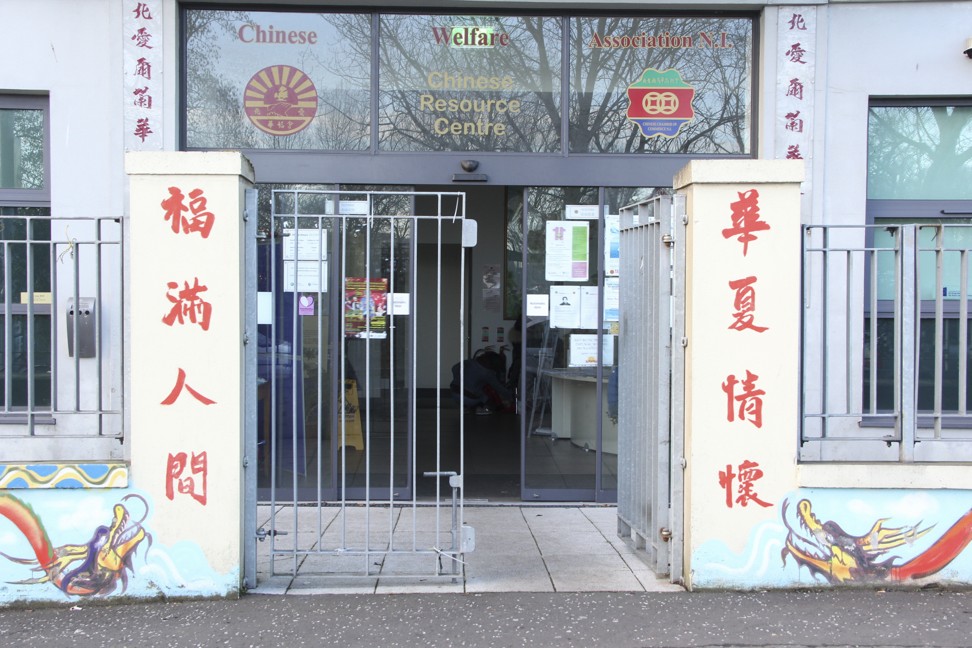
The organisation, of which Lo was previously a managing director, was set up in 1986 to help integrate Chinese in Northern Ireland “within a framework of racial equality”.
“I know many in the Chinese community are really worried about Brexit, especially those who run businesses because they trade across the border. And there’s confusion and worry over visas and residence status,” says Olphert, a fluent Mandarin speaker who has lived and worked in mainland China.
Olphert and two Queen’s University students from mainland China, who volunteer at the association, enter into an intense discussion on how to best to translate “backstop”. They finally agree that bǎozhèng (保证), “guarantee”, comes closest.
Lo lives in Holywood, a leafy, affluent middle-class commuter and retirement parish that abuts Belfast Lough, which the ferry to Liverpool and Scotland plies – as do the cruise ships that dock in the city to allow passengers to enjoy Belfast’s many attractions, including the Titanic docks, the studio and filming locations of Games of Thrones, the Giant’s Causeway geological wonder and the murals that declare their creators’ allegiances to territory, religion and political ideology.
When people say I have retired, I reply: ‘Retired from what?’ This place has not been in session for over two years. Imagine that! No politics have taken place in our parliament for two years!
Lo and I jump into my hire car and head not to her home, but into 21st-century Belfast, a buzzing city flush with prosperity and modernity, and, until recently, a growing multicultural population. I have several photo-shoot backdrops in mind. One is a menacing mural in loyalist east Belfast depicting armed paramilitaries, similar to those Lo wanted painted over for the international bike race. Oh no, she’d rather not go there, she says. I offer an alternative, on the nationalist Falls Road.
As it is on the way, we head first to Stormont, the Northern Irish parliament building. At the gates, the security guard recognises Lo and waves us through. The place is deserted.
“When people say I have retired, I reply: ‘Retired from what?’ This place has not been in session for over two years. Imagine that! No politics have taken place in our parliament for two years!” exclaims Lo, wiping the frustration and rain from her face.
Northern Ireland holds the world record for the longest period without a sitting government. The devolved executive and assembly – which have powers over the region – collapsed in January 2017 over a policy scandal between the power-sharing DUP and Sinn Féin, the largest nationalist party. The parliament remains suspended, the parties at an impasse.
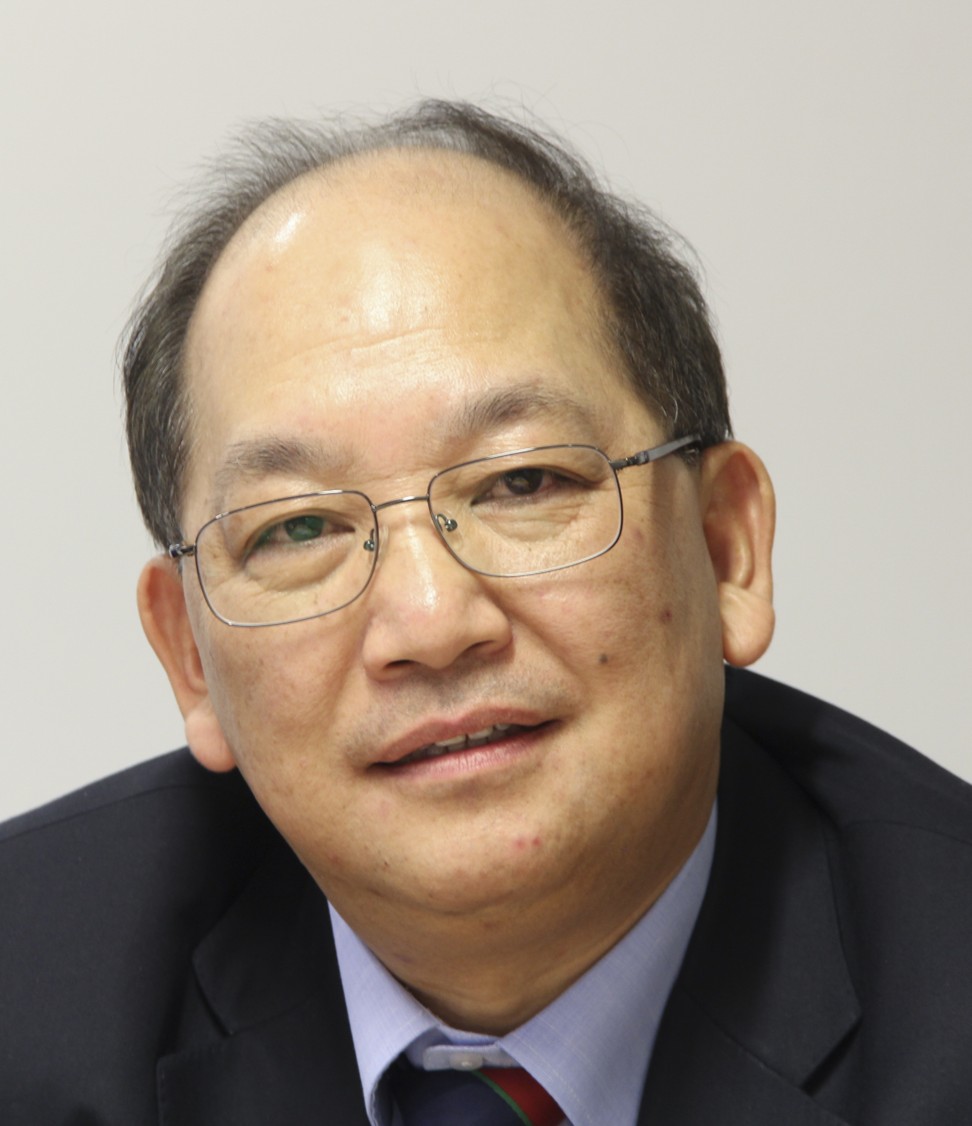
The day after our visit, the dust sheets would be pulled off and the lights switched back on as May made a flying visit to implore the DUP to back her withdrawal agreement, one of many such pleading missions. It, too, ended in failure and, at the time of writing, it looks unlikely the United Kingdom of Britain and Northern Ireland will be leaving the EU as planned, on March 29.
Danny Wong is wearing an apologetic expression and a disarming smile, like a doctor preparing to deliver bad news. Clearly, what the chairman of Northern Ireland’s Chinese Chamber of Commerce is about to say is to be said with the deepest regret, and after much deliberation.
“We just feel we have to speak out about the damaging effects many of our members are already suffering because of Brexit. We just don’t know what is going on. We need certainty from the politicians, especially over workers’ rights,” he says. “That’s why we’re keen to speak to the media.”
The four other members in the room – all business owners – listen in silent agreement, resigned to entering the political fray.
“All the major wholesale suppliers are worried – we all are – about the future, about staffing, supplies, tax and customs, let alone how to navigate a possible hard border,” says Wong. “Many members trade with the south.”
If I have to start hiring more British citizens in the future to drive the trucks and staff the warehouse, that’s fine. I don’t mind paying the higher wages they demand. But prices for my customers will also go up
One of those already losing business is Bruce Lee, the owner of Lee Foods Oriental, a supermarket and wholesaler he has run for 30 years, serving scores of catering outlets north and south of the invisible border.
Long reliant on EU workers, staff recruitment had never been a problem. But when one of his Polish delivery drivers went on long-term sick leave last month, he had few options.
“When I looked about for a qualified replacement via recruitment agencies, there were none available. So I had to drive the truck myself,” says Lee. “That has not happened for a long time.”
The reservoir of labour that has kept operating costs and prices low for businesses and their customers is fast running dry as citizens from the European Economic Area retreat home ahead of Brexit. Latest figures from the Department for the Economy reveal there were 14,000 fewer EU nationals working in Northern Ireland at the end of March 2018 than when the June 2016 referendum was held, representing a 26 per cent drop.
“If I have to start hiring more British citizens in the future to drive the trucks and staff the warehouse, that’s fine. I don’t mind paying the higher wages they demand. But prices for my customers will also go up,” Lee says.
Like many other Chinese suppliers, he is stockpiling some of his bestselling products, imported from the south.
“My biggest fear is a no-deal Brexit. I believe the cost of all goods and commodities will rocket by at least 10 per cent once the UK is out of the single market,” he says. “If a hard border is put in place, with customs clearance, delivery time will see long delays. That will hit businesses like mine hard.”
When I mention the demographic cliffhanger, a united Ireland referendum perhaps hingeing on the figurative Chinese woman voter in south Belfast, the room goes deathly quiet.
“We don’t know about that,” says Wong. “But we know the Brexit uncertainty is bad for business.”
I took it as read that Northern Ireland’s Chinese had voted unanimously to remain in the EU. Not so, says the owner of Mincat Tour, Min Shen.
“Many of the younger Northern Irish-born Chinese voted to leave. They fear their prospects, the jobs and prosperity created for them by their parents’ hard work, are being taken by the influx of Eastern Europeans,” says Shen, whose company hosted many of the 90,000-plus Chinese tourists who visited Northern Ireland last year.
China was important to Northern Ireland before the Brexit referendum. But obviously, in a post-Brexit operating environment we will be looking to do more
Brexit is pulling all sort of surprises, and Nolan later notes that Shen’s account mirrors the phenomenon of immigrants opposing immigration across the world. “Witness the support for Donald Trump’s wall from members of various ethnic communities in America,” Nolan says. Witness, too, the animosity towards people from mainland China among Hong Kong’s population.
But the Brexit cloud has at least one silver lining, according to Tim Losty, the Beijing-based director and minister counsellor of the Northern Ireland Bureau in China.
“Most Chinese had no idea that Northern Ireland existed,” he says. “Brexit has put us on the map.
“China was important to Northern Ireland before the Brexit referendum. But obviously, in a post-Brexit operating environment we will be looking to do more. We sell about £160 million [US$210 million] worth of goods, mainly agri-food and manufacturing equipment, to China, and we’re now promoting Northern Ireland’s sectors of health services and technology, added-value engineering, IT and creative industries.”
Beijing opened a consulate in Belfast in 2015, and Shen says Chinese tourist numbers are expected to reach 150,000 this year.
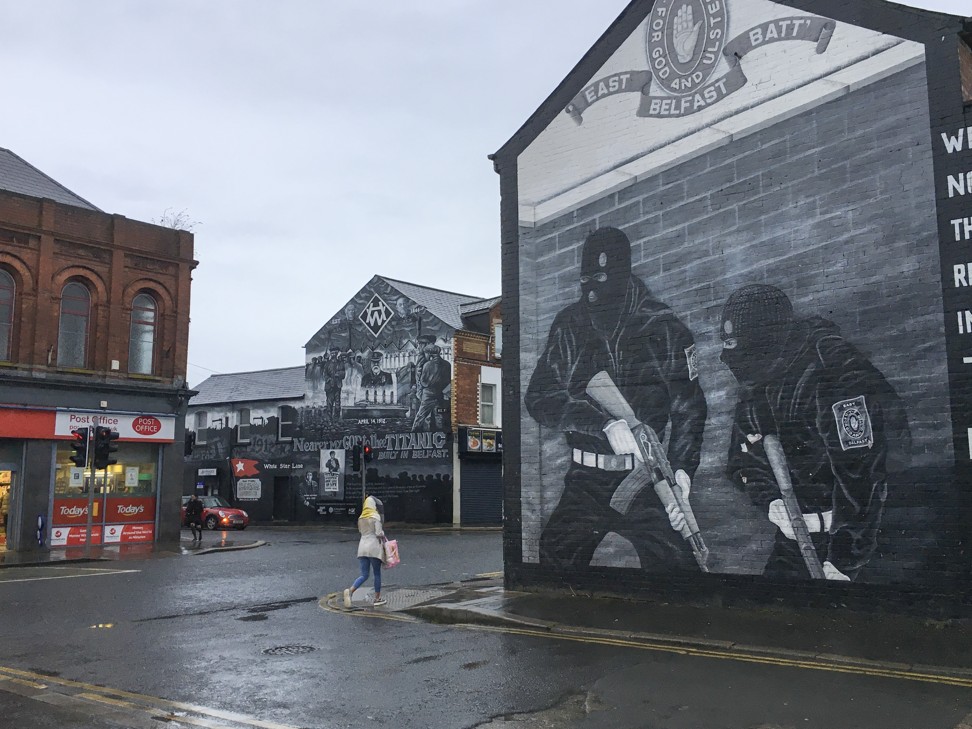
Stormont’s imposing facade shrinks in the rear-view mirror as Lo recalls how, then in her early 20s, she arrived in Northern Ireland in 1974, at the height of the Troubles, with her second husband (of three), David Watson, a former South China Morning Post reporter whom she met in Hong Kong. She worked for the BBC and the police as an interpreter, and became a social worker, receiving an MBE in 1999 for her dedication to public service and championing openness and equality.
A “born rebel” who found her voice challenging her parents while chafing against a traditional patriarchal society, she was elected Europe’s first ethnic Chinese parliamentarian in 2007. Over the years, she has seen and heard it all, she says, but admits she too is struggling to comprehend the seismic shifting of political plates, and finds it impossible to predict what the landscape will look like once the madness subsides.
We enter the Falls Road.
“I much prefer the murals here,” she says, as we pass walls and terrace ends daubed with colourful slogans, flags, emblems, faces and dates. “They tell a story.”
The murals of west Belfast depict not only the struggle for sovereignty but also for equality. Socialist Workers Party slogans are painted cheek-by-jowl with depictions of martyrs and the forefathers of the Troubles – hunger striker Bobby Sands and the rebel heroes of the 1916 Easter rising, which led to Ireland’s independence from Britain in 1921, and subsequently to a divided island.
We park and wait for the weather app’s promise of a respite from the rain. We discuss Hong Kong – her sister still lives in the city – and Lo says she sympathised with the “umbrella movement” because she has always fought for the underdog. But she also says Hong Kong is part of China and there is nothing to be done about that but to accept the fact.
The rain finally stops and we walk towards a long wall daubed with murals that leads to the 5.5-metre-high (18ft-high) fortified peace wall, which separates the Falls Road from the loyalists’ Shankill housing estates; large, prison-like gates are maintained for quick closure whenever trouble flares between the two communities.
One part of three connected murals reads “Bring Down The Walls”, with the word “Party” fortuitously written beneath. It makes for a neat frame. “Oh, I love it,” says Lo, when I show her the shot. “Yes, a great name for a political party!” she adds.
Does she ever think about a return to politics? “Oh, no, I don’t think so,” she says, dismissing the idea with ironic laughter.
We drive back across Belfast, passing walls without murals – each a potential canvas on which to depict a Chinese woman casting the vote that decides the future of Ireland, perhaps.